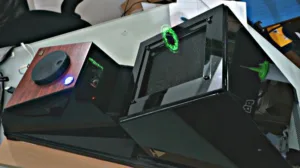Holovect (Austin, TX)is developing a laser-based volumetric display in which the complete system can fit on a lab bench or desktop. Company literature clearly states that image produced by the Holovect Mk II is, in fact, not a true hologram. Rather, it is a volumetric vector image in which a 3D projection appears as a free-floating object in “modified” air.
The operating principle of the Holovect system uses the fact that the trajectory of light rays will, in general, be affected when traveling through an interface between two media. Such effects include refraction, reflection and diffusion. The extent to which each of these effects actually occurs depends, in part, on the extent to which the index of refraction of the two media differ from each other. It is possible for index of refraction differences to exist even in an otherwise homogeneous media (such as air) due to, for example, local variations in temperature or pressure.
Holovect has apparently invented a means to control the index of refraction of air within specific regions of a cube shaped volume. Using this means, it is possible to modify the proportion of the incident light that is reflected as well as the details of the light refracted at the boundary. Given this capability and by simultaneously controlling the aim of a laser and the position of a modified volume of air, a computer controlled optical system can place a spot of light anywhere within the cubic volume. By keeping the laser beam on as it traverses a column of modified air from a first to a second point, it is possible to draw a line or 3D vector. By joining many such vectors in a sequence, it is further possible to generate a 3D vector object.
The Holovect Mk II is capable of drawing a complete 3D vector object 50 times per second within a cubical volume that is 12cm x 12cm x 12cm. The company calls this volume a drawbox.
A video that shows the Holovect Mk II in operation can be found at the end of this article.
At this time, the Holovect Mk II is limited to a single color. As shown in the figure, the image is green. Future development may eventually include production of a Holovect system that has full RGB color capability. The company has stated that the principle reason that the current system was designed without full color capability was not so much technical as it was to not incur the added cost of doing so. The company went on to explain that “now it makes sense to ship more versions of a less powerful device than the opposite.” The Holovect Mk II is reported to have a price of about $700.
Data Structures for 3D Objects
“Vect” objects are the data-structure developed for the Holovect. These objects are basically a list of 3D coordinates that result in lines drawn in a head-to-tail sequence in space. These lines are then compiled into so-called vect class objects. Such files can be created using a variety of online tools such as Plotly, spreadsheets or even by drawing.
Uploading an object to the Holovect Mk II can be as simple as plugging in a USB key. Once loaded, vect objects can be rotated around all three axes and moved around within the drawbox. Objects can be manipulated using the control knob, preset functions or by a user designated application.
The company suggests that the Holovect Mk II can be used to visualize CAD models before 3D printing. Doing so is claimed to increase design and manufacturing efficiency by saving time and material before initiating the printing process. Other proposed applications include the visualization of 3D data acquired through a 3D scanner or a computed tomography scan and advertising/branding. Also, since it is possible to move and combine the virtual objects produced by the system in real time, it should be possible to create simple interactive games.
The company plans to fund the remaining development of the Holovect Mk II through a Kickstarter campaign. A description of the project can be found here. As of the date this article is written, 178 backers have pledged a total of $60,099 against a goal of $45,000. This project should, therefore, fund on Nov 11th.
One future goal for the company is to build a website where “users can share their own creations and see what others have done.” Estimated delivery of the systems offered as premiums in the Kickstarter campaign is listed as in December, 2016. -Arthur Berman

